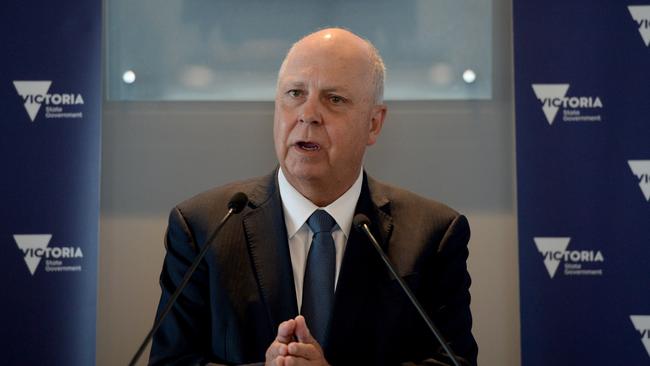Jacinta Allan farewells Treasurer Tim Pallas with a pledge of more of the same for smashed state
Victorian Treasurer Tim Pallas will quit politics after 10 years running the budget, leaving a legacy of record high debt, soaring taxes and business anger.

An unapologetic Jacinta Allan will plough on with Victoria’s high debt, high taxes fiscal strategy, arguing that it is Labor’s way to protect workers and families rather than adopt a deeper austerity agenda that critics argue would lead to revenue-raising cuts and business growth.
The Victorian Premier on Monday hailed the strategy of outgoing Treasurer Tim Pallas, who has been blasted by business and the Coalition for adopting a big-spending, high-taxing route through – and out of – the pandemic.
Mr Pallas, 64, was respected internally for his negotiation skills but criticised, even among former cabinet colleagues, for failing to stand up to former premier Dan Andrews, whose big-spending agenda has left Victoria’s net debt hurtling towards nearly $190bn by the end of June 2028.
Ms Allan said the next Victorian treasurer would face the job with the same imperatives as Mr Pallas, who served in the role during an explosion in public service spending, record taxes, massive major project overspending, the death of a Commonwealth Games bid and a virtual collapse of the old Victorian Right faction.
Assistant Treasurer Danny Pearson – the minister for the much-criticised Suburban Rail Loop – has long been seen as the frontrunner for the Treasury role with Education Minister Ben Carroll also seen as a potential replacement for Mr Pallas.
Both men grew up in the old Victorian Right, which has a reputation of being fiscally prudent, with Mr Pallas having shuffled across to the Left after the National Union of Workers folded into the United Workers Union.
The NUW, the former home of Labor powerbrokers Bill Kelty, Simon Crean and Bill Landeryou, traditionally was one of the staunchest adherents to fiscal responsibility.
On the back of more bad budget news, Labor last week announced Victorian households would be charged an extra $60 a year to help fund emergency services, that parking in inner Melbourne would rise, and a $100 car registration discount for electric vehicles would be scrapped.
This was caused by the state plunging $1.4bn further in deficit than forecast in May’s budget.
Despite the budget headwinds, Ms Allan said the fiscal strategy was working and the settings were sound. “Coming out of the pandemic, putting in place a fiscal strategy that was looking at how do we work through those challenges of the pandemic but look to the future,’’ she said. “And that fiscal strategy is working.’’
She rejected calls from political opponents and commentators for austerity measures.
Mr Pallas announced his decision after lengthy speculation he would quit the post, opening the way for a critical by-election in his western suburbs seat of Werribee, which Labor holds with a margin of 10.9 per cent.
Labor will be happy to merely hold the seat amid a cost-of-living crisis, while Liberal leader John Pesutto would benefit from a large swing and potentially retain his leadership on the back of a victory.
Mr Pallas was one of the highest profile Victoria Labor figures in the past 25 years, having been on the ground floor as an adviser when Labor came to power in 1999.
He is widely admired in Labor circles for his negotiation skills but his stint as a treasurer has been widely criticised across business.
“I’ve had my time for better or worse. I’ve tried my best,’’ he said.
He became an MP in 2006 and describes himself as the state’s longest-serving, stand-alone Treasurer. “Renewal is important, and after 10 years as Treasurer, it is time for me to hand over the reins. Importantly, this will allow the government to establish the strong team that will contest the 2026 election,’’ he said.
Opposition Treasury spokesman Brad Rowswell said: “After 10 years of Labor, Victoria’s finances have been poorly managed by the Labor government with debt expected to skyrocket to $187.8bn by 2028, the fourth highest debt of a sub-national government (outside of the US). Since 2014, Victorians have been paying the price for Labor’s financial recklessness and incompetence with 57 new and increased taxes introduced. Each new tax is an attack on aspiration, investment and choice.
“In 2025, during a prolonged cost-of-living crisis, Victorians will be hit with Labor’s hikes to probate fees, an expanded vacant residential land tax, a new holiday and tourism tax and a $2.1bn increase to the fire services levy.
“Victoria needs an urgent change of course and a government that will respect them and their hard-earned money.’’




To join the conversation, please log in. Don't have an account? Register
Join the conversation, you are commenting as Logout